Detailed description
| Detailed description |
The entertainment head unit is mounted in the centre of the dashboard. The head unit receives audio and antenna signals from other units in the system. The signals are transmitted on from the unit's outputs to the speakers of the Premium 70 audio system and by I-bus to the amplifiers of the Premium 150, Prestige 300 and Bose® audio systems.
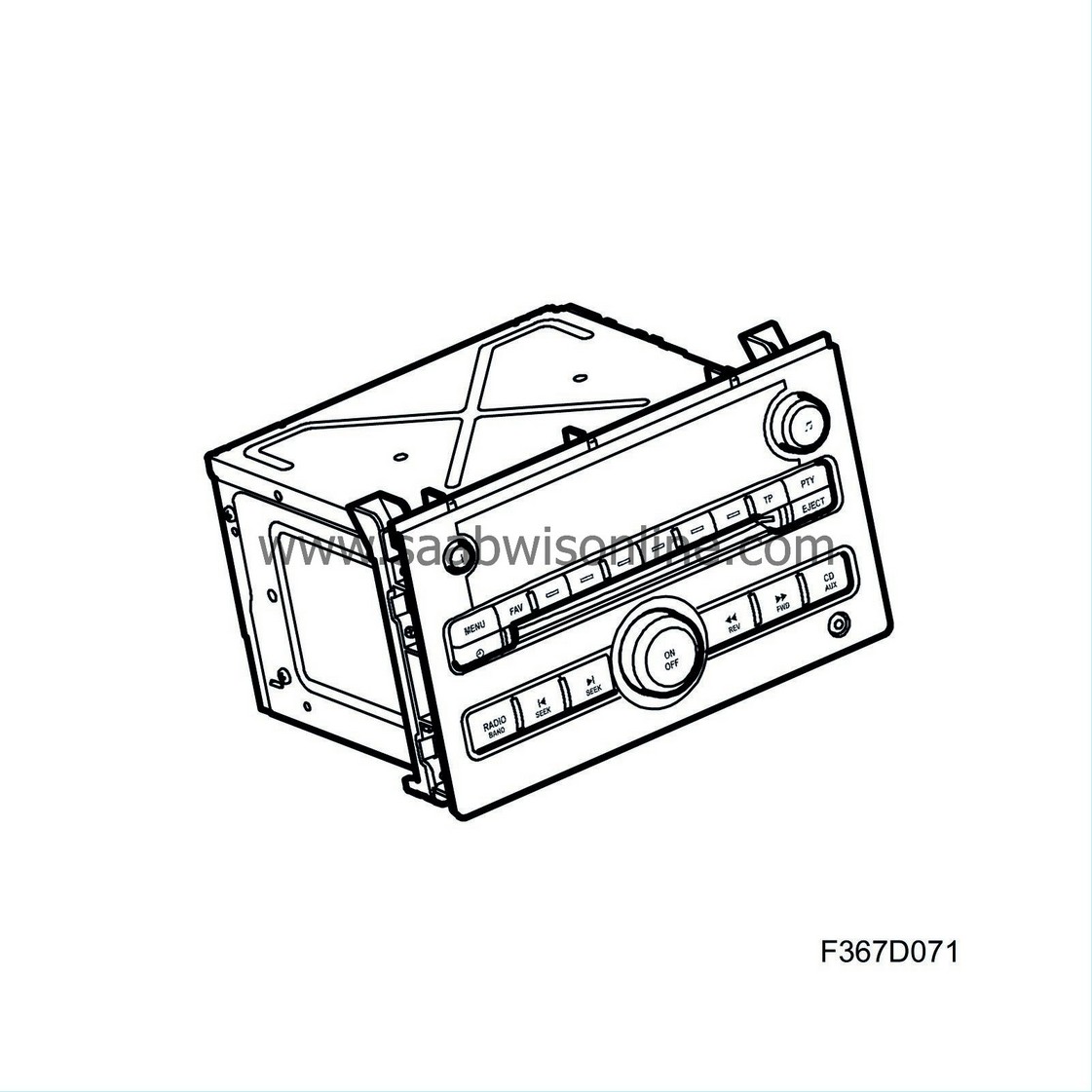
The hardware is the same for all markets and is controlled by "end of line programming". If the unit is to be replaced, it must be programmed for the relevant market. Security access from TIS is required to "marry" and "divorce" the audio unit from the car.
| Control panel |
The control panel is used to select functions. See Audio system operation .
| Important | ||
|
In the service manual the normal handling of the audio system is not dealt with. Detailed information regarding handling can be found in the owner's manual. |
||
| Steering wheel controls |
There are steering wheel controls for selecting preset stations (2), tuning (2) and volume control (1). The CIM converts the press of a button to a bus message that is received by the EHU, which carries out the instruction.
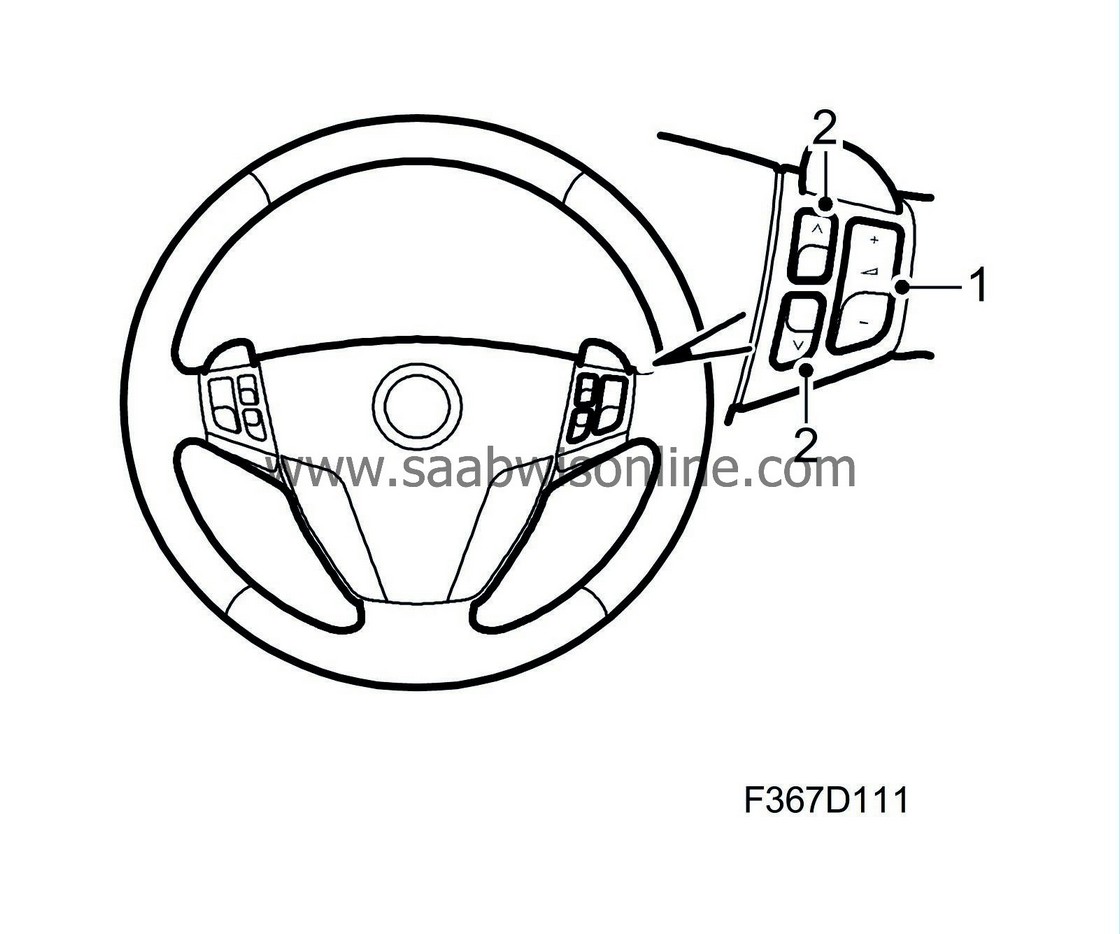
| Display |
The radio receiver uses the SID display to indicate the set station or other player information, such as CD.
| CD player |
The CD player is front loaded. The disc compartment holds one CD.
The CD player is activated by loading a disc in the compartment or by pressing the CD AUX button if a disc is already loaded.
Once all tracks have been played, the player begins playing the CD from the beginning again. The CD player is switched off with the ON/OFF button of the audio system or by selecting another audio source.
The CD is ejected through a press on the EJECT button. If the ejected disc is not removed, the player draws the disc back in after about 10 s for reasons of safety.
| CD changer |
The CD changer is front loaded. The disc compartment holds six CDs.
The CD changer is activated by loading one or more CD/MP3 discs into the compartment or by pressing the CD AUX button if a disc is already loaded. Press the LOAD button and follow the instructions on the display to load a disc.
Once all tracks have been played, the player begins playing the CD from the beginning again. The CD changer is switched off with the ON/OFF button of the audio system or by selecting another audio source.
The CD is ejected through a press on the EJECT button. If the ejected disc is not removed, the player draws the disc back in after about 10 s for reasons of safety.
| MP3 player |
The audio system can play MP3 files that have been recorded onto a CD-R disc with the following bit speed: 32-320 kbps. The sound quality may vary depending on the quality of the CD-R, recording method or quality of the recorded music. The audio system can read and play a maximum of 50 MP3 folders, 50 play lists, 10 sessions or 255 MP3 files. Discs containing more folders, play lists, sessions or files will be played up to the max. limit. Everything thereafter will be ignored.
The MP3 player is activated by loading a CD-R disc with MP3 files in the disc compartment or by pressing the CD AUX button if a disc of MP3 files is already loaded.
The MP3 player is switched off with the ON/OFF button of the audio system or by selecting another audio source.
The MP3 disc is ejected through a press on the EJECT button. If the ejected disc is not removed, the player draws the disc back in after about 10 s for reasons of safety.
| Amplifiers and speakers, 4D |
The main entertainment unit has an integrated amplifier that drives the speakers of the Premium 70 sound system. The Premium 70 sound system has two speakers in the outer edges of the dashboard and two in the outer edges of the parcel shelf.
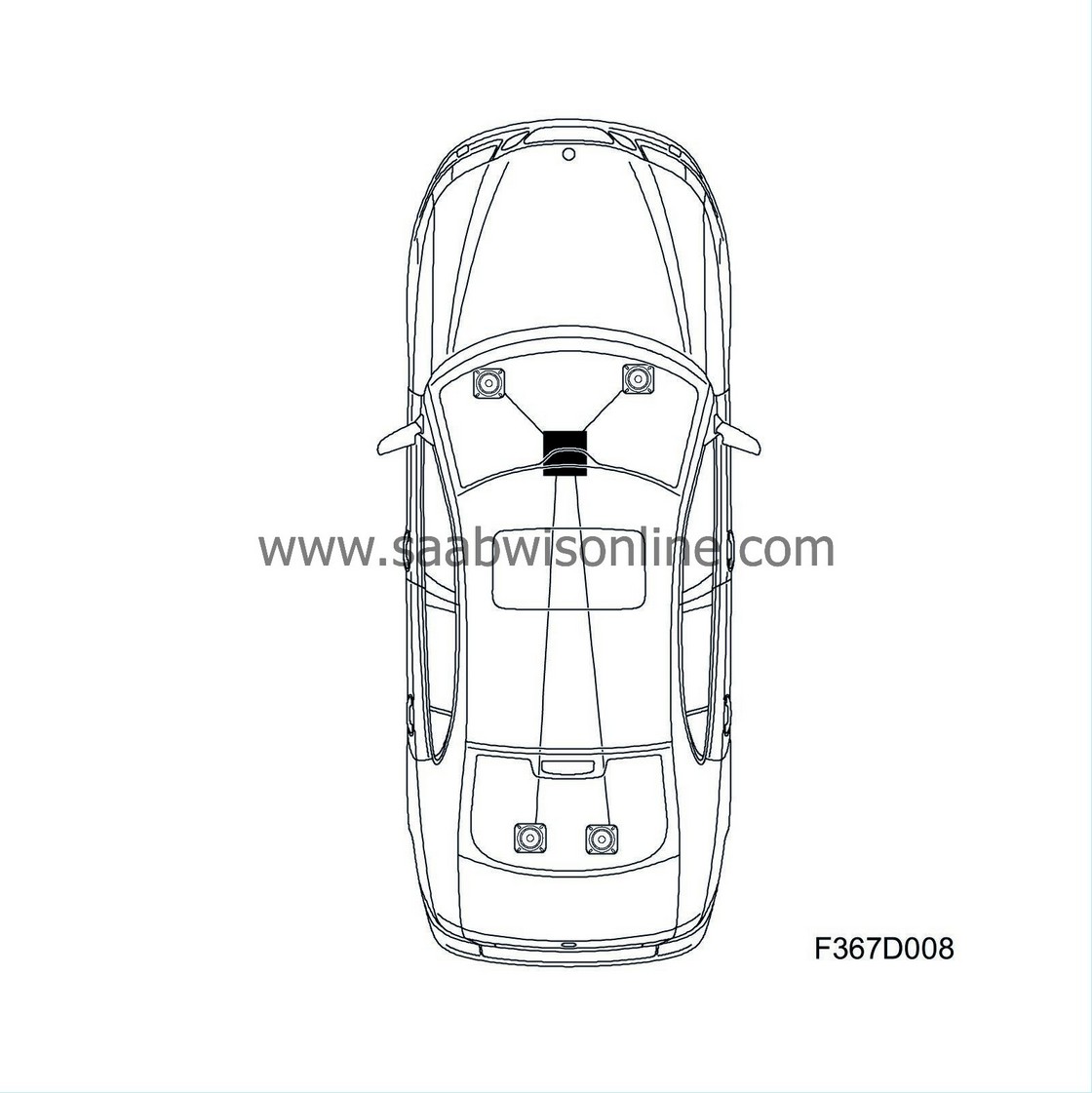
The Premium 150 audio system also includes speakers in the front doors and a centre speaker in the dashboard. The amplifier drives all speakers and is mounted on the left side of the luggage compartment.
The Bose® Centerpoint® Surround System also includes 2 speakers in the rear doors and two bass speakers in the outer edges of the parcel shelf. The amplifier has been replaced with a 10 channel amplifier which drives all speakers. The amplifier is mounted on the left-hand side of the luggage compartment.
All speaker cables are twisted pairs. This makes them less sensitive to the induction of disturbances from other cables.
| Amplifiers and speakers, 5D |
The main entertainment unit has an integrated amplifier that drives the speakers of the Premium 70 sound system. The Premium 70 sound system has 2 speakers in the outer edges of the dashboard and 2 in the outer edges of the luggage compartment.
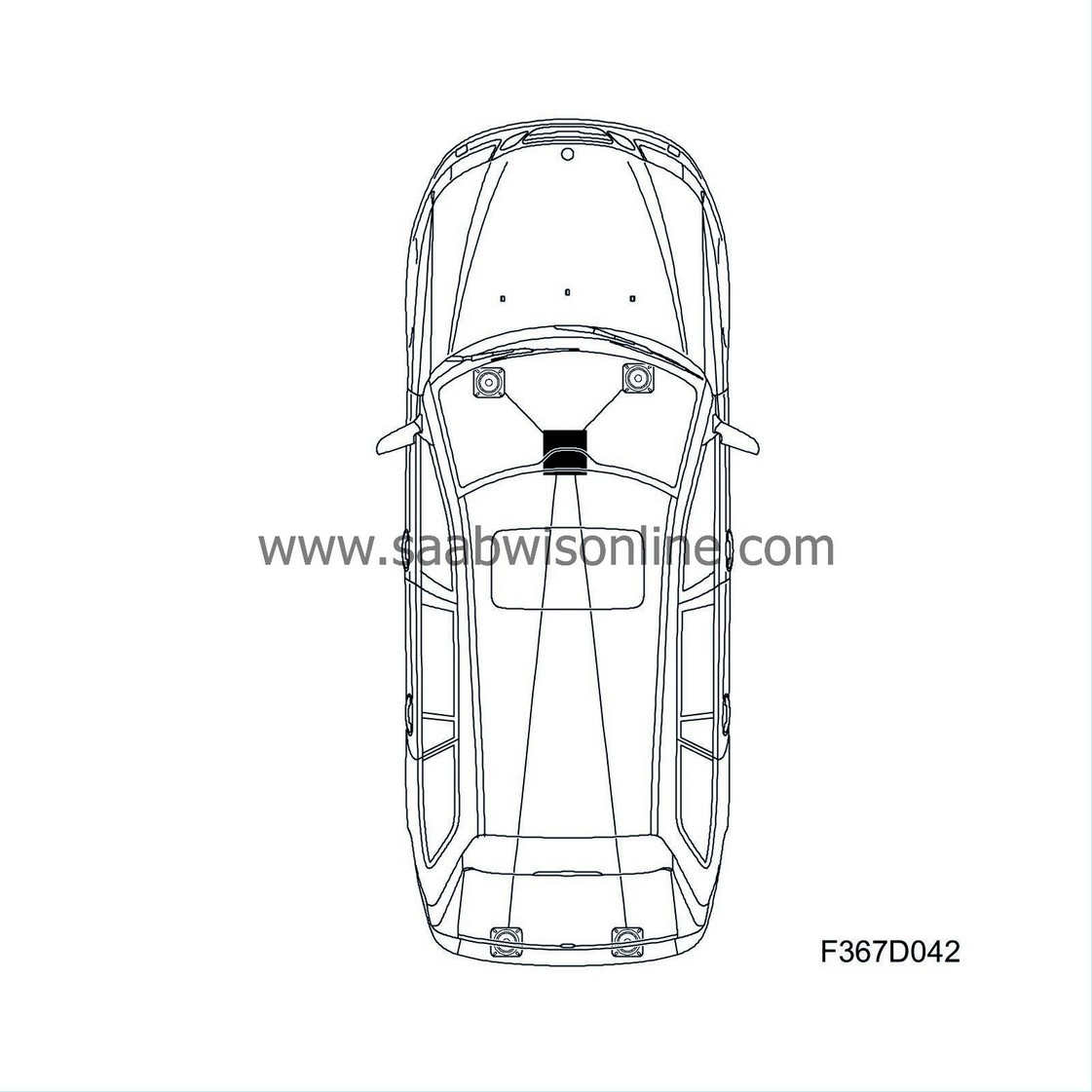
The Premium 150 audio system also includes speakers in the front doors, a centre speaker in the dashboard and an amplifier. The amplifier drives the front and rear speakers. The amplifier is mounted on the left side of the luggage compartment.
The Bose® Centerpoint® Surround System also includes two bass/mid-range speakers in the rear doors and two bass speakers fitted in a box in the luggage compartment. The amplifier has been replaced with a 10 channel amplifier which drives all speakers. The amplifier is mounted on the right-hand side of the luggage compartment.
All speaker cables are twisted pairs. This makes them less sensitive to the induction of disturbances from other cables.
| Amplifiers and speakers, CV |
An amplifier for the speakers in the Premium 70 audio system is integrated in the EHU. The Premium 70 audio system includes 2 speakers in the outer edges of the dashboard and speakers in the right-hand and left-hand rear side trim.
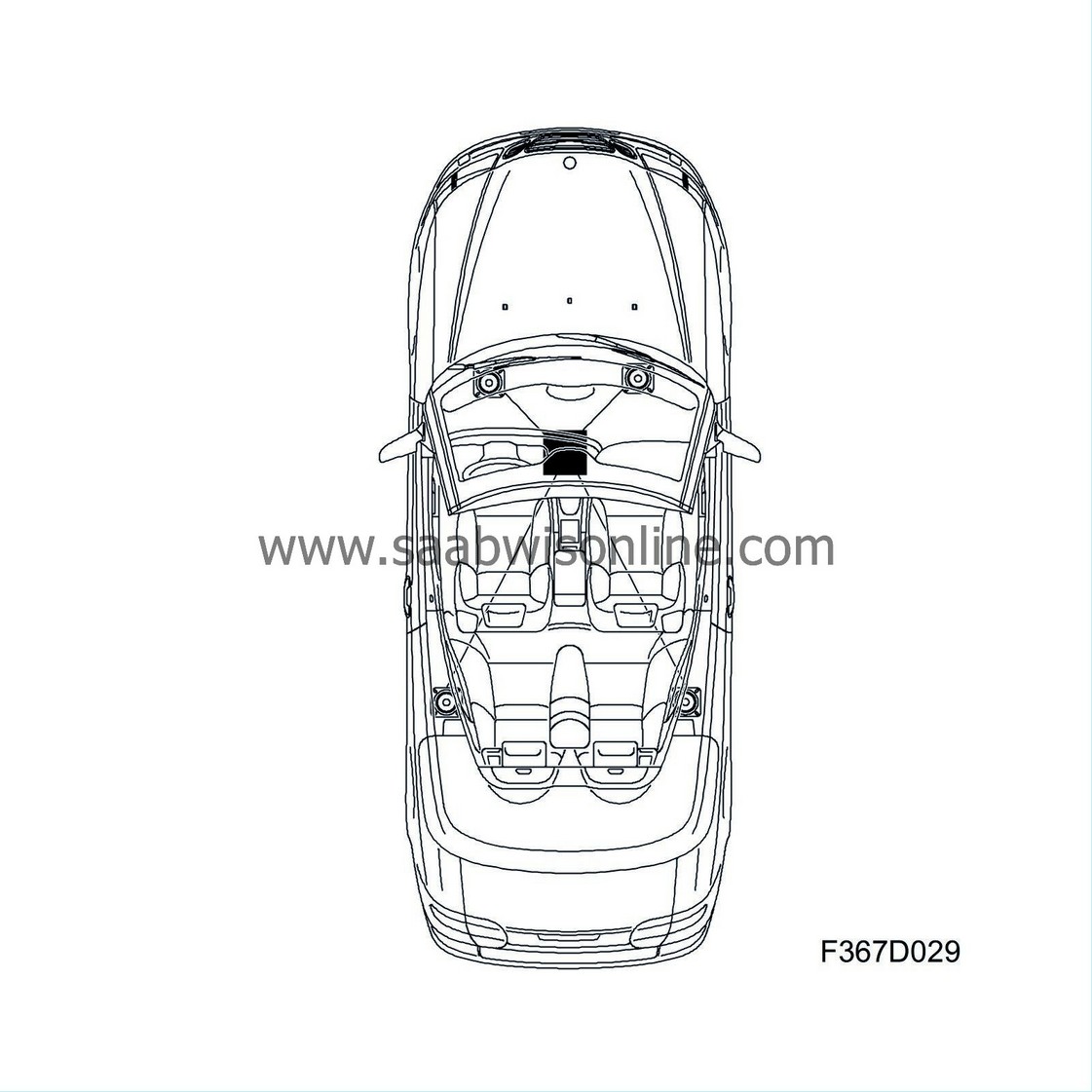
The Premium 150 audio system also includes speakers in the doors, a centre speaker in the dashboard and an amplifier. The amplifier drives the front and rear speakers. The amplifier is mounted on the left side of the luggage compartment.
The Prestige 300 audio system also includes 2 tweeters in the dashboard, a bass speaker behind the rear seat backrests and an amplifier for the bass speakers. The amplifier is mounted on the left side of the luggage compartment.
All speaker cables are twisted pairs. This makes them less sensitive to the induction of disturbances from other cables.
| Antenna, 4D |
The system has two antenna systems.
Antenna system 1 consists of one antenna for FM reception and one for AM reception. The FM antenna uses the rear window heating element while the AM antenna is a separate circuit at the top or the rear window. Both antennae are connected to an antenna amplifier located on the right-hand C-pillar. There is an antenna filter mounted on the ground side of the rear window heating element that removes interference when the rear window heating is on.
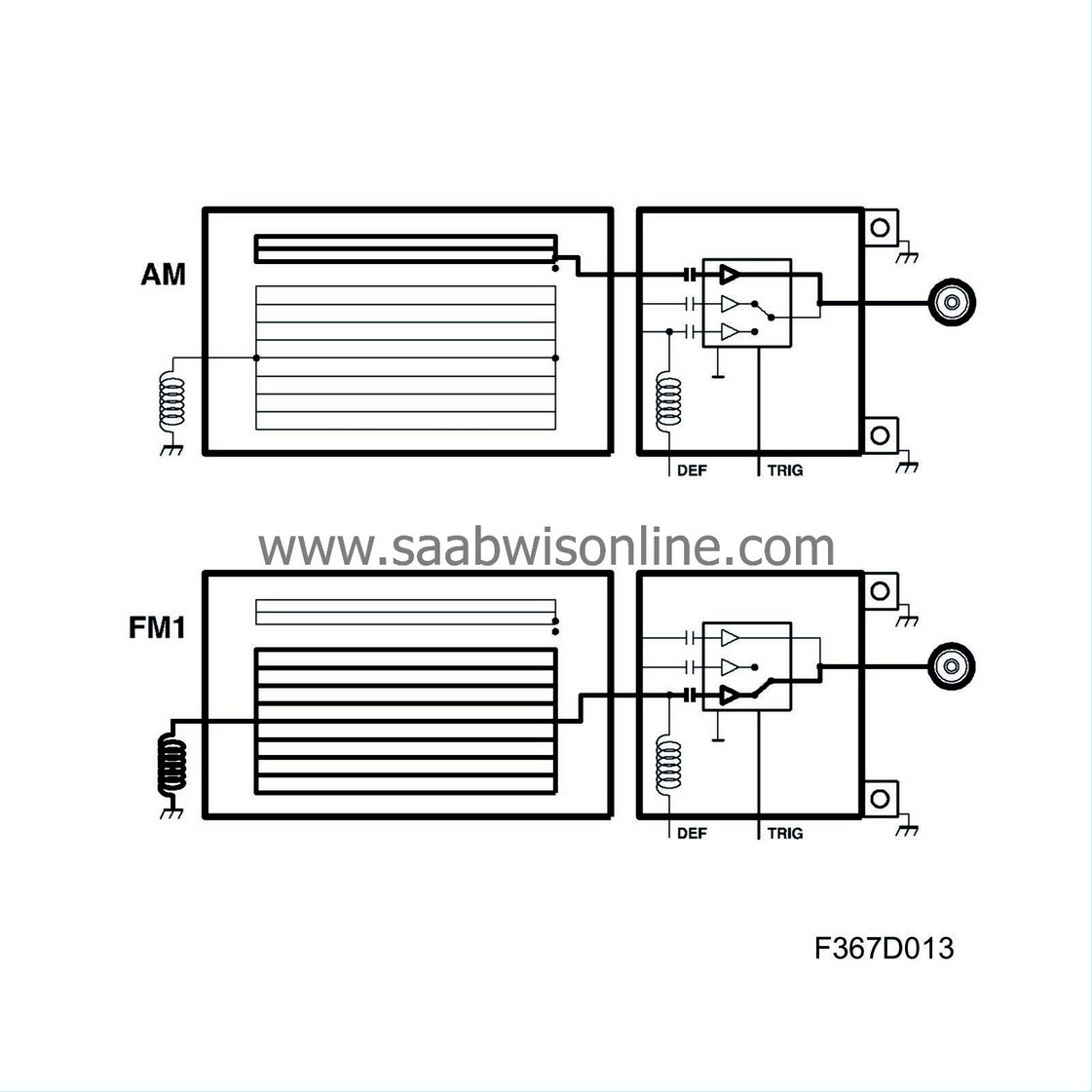
Antenna system 2 includes a diversity function and additional antenna for FM reception. This FM antenna is integrated in the AM antenna. The antenna amplifier has an additional connection for FM reception. The amplifier uses the strongest FM signal and relays this to the EHU.
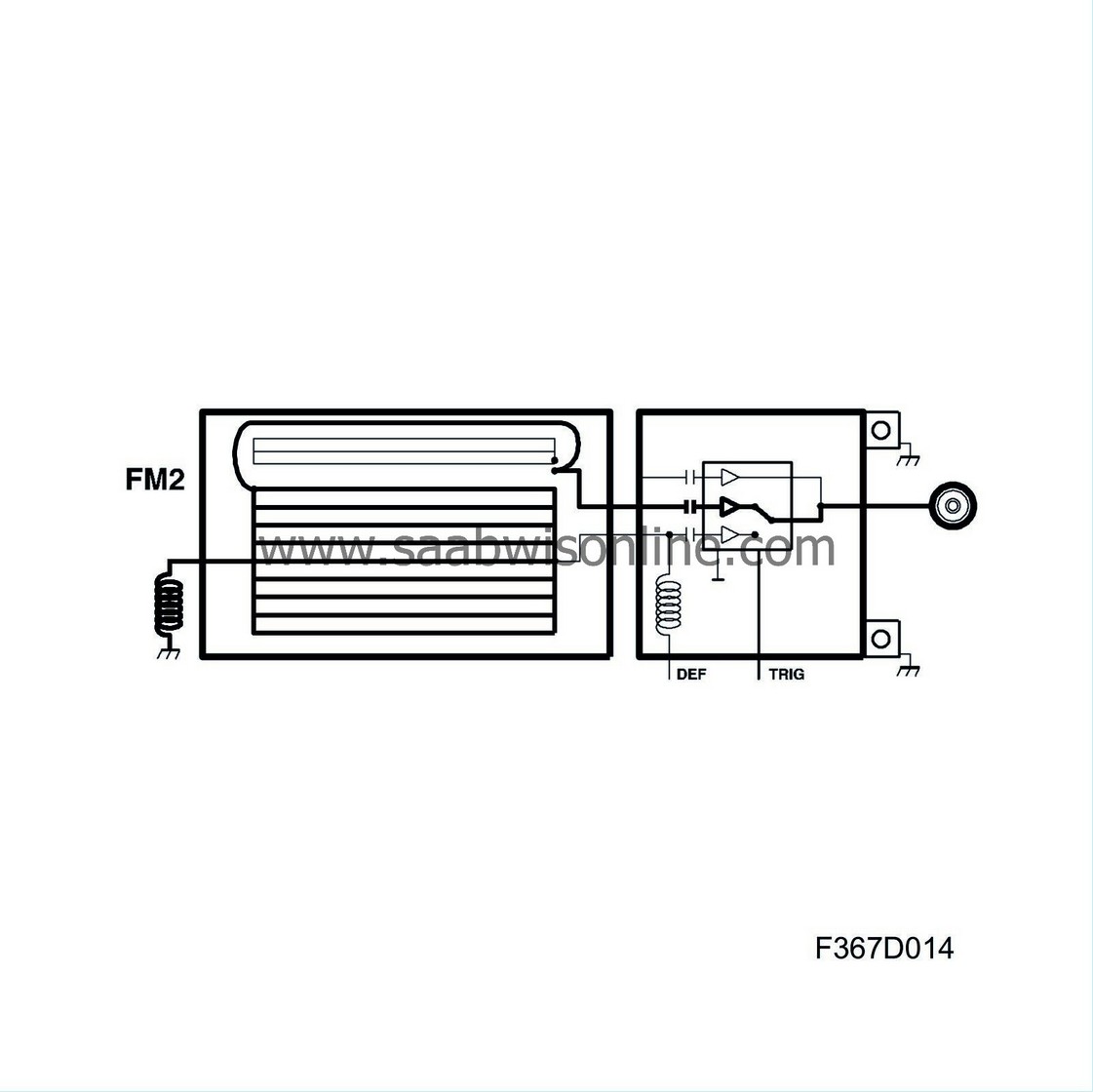
| Antenna, 5D |
There are two different types of antenna system for the audio system:
| • |
Antenna system 1 with an AM/FM antenna and an antenna amplifier.
|
|
| • |
Antenna system 2 with an AM/FM antenna, FM antenna and an antenna amplifier for each antenna.
|
|
The antenna for radio reception are integrated in the rear side windows and are located as follows:
| • |
The AM/FM antenna is located in the rear right side window.
|
|
| • |
The FM antenna is located in the rear left side window.
|
|
The antenna amplifiers are located below the respective rear side windows and are available in three versions, one for antenna system 1 and two for antenna system 2.
The antenna signal is amplified in the antenna amplifier and fed via a coaxial cable to the head unit (radio). The amplifier is supplied with a trigger voltage from pin 13 (K8B) on the head unit and is grounded through the bolt screwing it to the body.
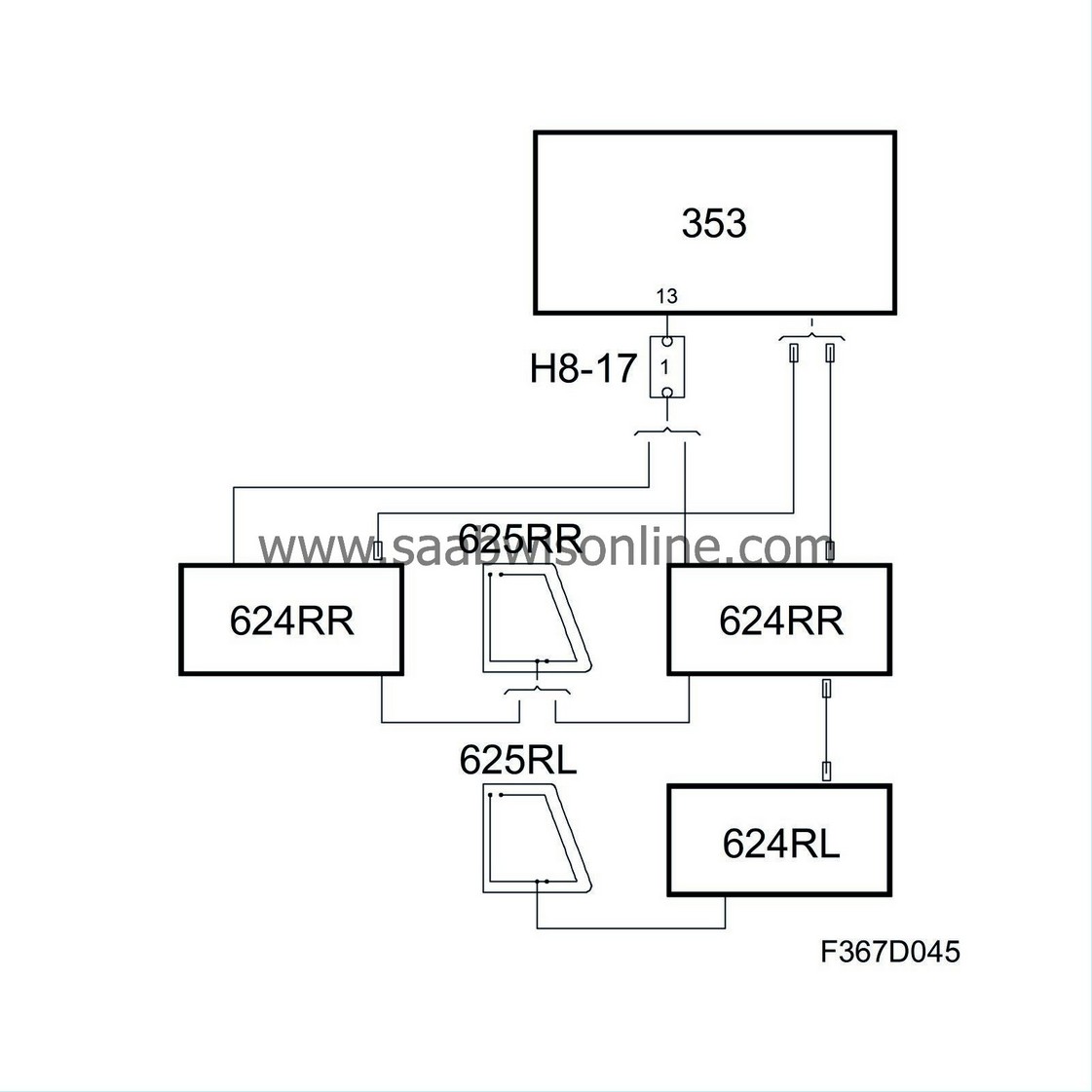
Antenna system 1
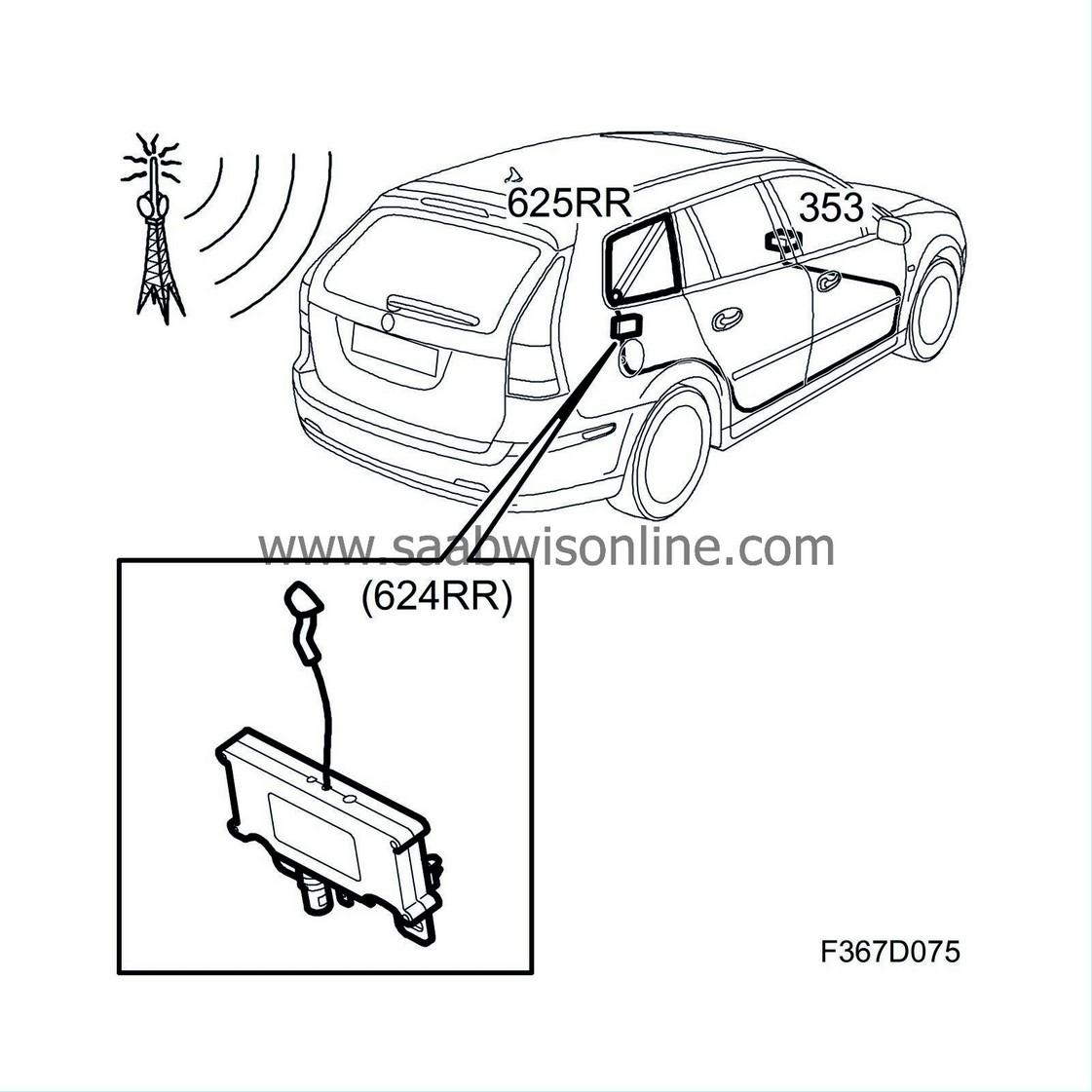
Antenna system 1 comprises:
| • |
AM/FM antenna integrated in rear right side window.
|
|
| • |
AM/FM antenna amplifier, on right-hand side
|
|
| • |
coaxial cable between the antenna amplifier and the head unit (radio)
|
|
Antenna system 2
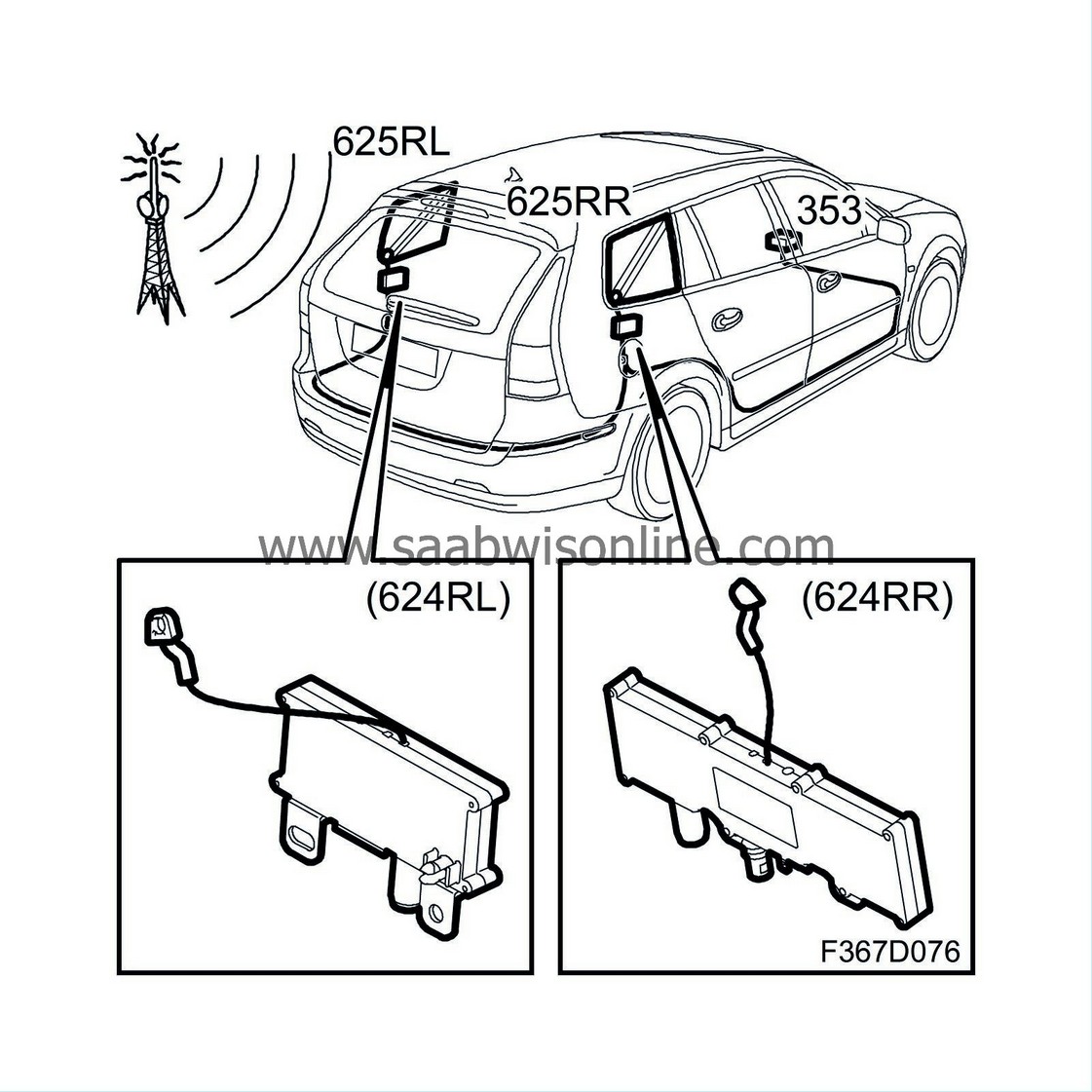
Antenna system 2 comprises:
| • |
AM/FM antenna integrated in rear right side window.
|
|
| • |
AM/FM antenna amplifier, on right-hand side
|
|
| • |
FM antenna integrated in rear left side window
|
|
| • |
FM antenna amplifier, on left-hand side
|
|
| • |
coaxial cable between FM amplifier on the left-hand side and AM/FM amplifier on the right-hand side.
|
|
| • |
coaxial cable between AM/FM amplifier and the head unit (radio)
|
|
Antenna system 2 has a diversity function which allows the radio receive to use the antenna that produces the best signal. The diversity function is available as an option.
| Antenna, CV |
The radio antenna (FM/AM) is located on the right-hand side of the soft top cover. An antenna amplifier (624b) in the antenna base transmits antenna signals to the EHU via the converting connector (624a) located at the right-hand A-pillar.
| Sound generator |
The EHU also acts as a sound generator for various warning and information signals, even when the audio system is switched off. The EHU generates a tick-tock for the direction indicators, a chime to notify of messages on the SID display, alarm for the trip computer, sound for the parking assist system and sounds for the key and seat belt reminder and light and speed warnings.
| Option |
The audio system is prepared for telephone installation.
| Connection, AUX |
The AUX input is located at the bottom right of the audio system. The connection is used to connect a portable unit, such as an MP3 player, to the audio system. Volume is adjusted via the control panel or steering wheel. Functions such as changing track or fast forward or rewind are handled via the portable player.


